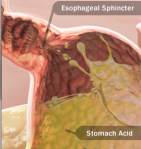Is it Heartburn or is it GERD?
Most of us have had an occasional bout of heartburn, and as unpleasant as it might be, it’s relatively benign. On the other hand, if heartburn becomes chronic, it may be a symptom of GERD, short for gastroesophageal reflux disease.
November 24-30, 2019 is GERD Awareness Week in the United States. American Thanksgiving is celebrated each year on the fourth Thursday of November and often involves overeating, so that week is dedicated to educating the public about GERD, a disease which affects about 20% of the population and revolves around the digestive system.
GERD is also known as acid reflux disease and its prevalence is on the rise. Because GERD is a primary risk factor for esophageal cancer, it’s important to develop preventative habits and understand the triggers.
GERD affects the lower esophageal sphincter, which is the ring of muscle between the esophagus and stomach. In normal digestion, the lower esophageal sphincter opens to allow food to pass into the stomach and then closes to prevent food and stomach acids to flow back upwards.  Reflux occurs when the esophageal sphincter is weak and allows the stomach contents to go back upward into the esophagus.
Reflux occurs when the esophageal sphincter is weak and allows the stomach contents to go back upward into the esophagus.
 Reflux occurs when the esophageal sphincter is weak and allows the stomach contents to go back upward into the esophagus.
Reflux occurs when the esophageal sphincter is weak and allows the stomach contents to go back upward into the esophagus.
If heartburn occurs more than once a week, becomes more severe, occurs at night and awakens you, these are possible signs of GERD. Less known symptoms that may be associated with GERD include belching, difficulty or pain when swallowing, a sudden excess of saliva, dysphagia (the feeling of food being stuck in the esophagus), chronic sore throat, laryngitis, gum inflammation, tooth enamel eroding, morning hoarseness, bad breath and a sour taste in the mouth.1
Whether you suffer from occasional or frequent heartburn or even GERD, there are some precautions that can help prevent episodes:
- Eat a plant-based diet. Greens, beans, onions, mushrooms, berries and seeds all help prevent or shorten GERD attacks. Winter squash, corn, beets and whole grains also help minimize symptoms.2
- Make green juice in a blender with cruciferous veggies such as cabbage or kale. These nutrient-rich foods promote a healthy digestive tract lining and help reduce stomach acids.3
- Eat five to six small meals a day rather than three larger ones. Too much food triggers acid production in the stomach.
- Eat your last meal of the day at least three hours before bedtime.
- Drink at least eight glasses of water daily, as water helps dilute stomach acid.
- Try to avoid citrus, because they produce more stomach acid. These include oranges, grapefruits, lemons and limes.
- Alcohol and smoking worsen GERD and heartburn symptoms.
- Fried and high-fat foods as well as caffeinated beverages trigger heartburn and GERD.4
- Try to maintain a healthy weight. Obesity or being overweight contributes to GERD. A British study of more than 10,000 people, ages 20 to 59, found that obese participants were nearly three times more likely to suffer GERD symptoms than those of normal weight.5
As we approach Thanksgiving, let’s be mindful of what we’re eating and how much we’re eating. It’s all part of Active Wellness and treating ourselves is enjoyable unless we have to suffer the consequences of overindulgence. During the holidays, it’s prudent to keep Kenzen® Cleanse & Detox and Kenzen® Digestion Complex 4-20 with you everywhere you go!
For more information about the Kenzen Cleanse and Detox and Kenzen Digestion Complex, click on the following link: http://nettrax.myvoffice.com/nikkenusa/ShoppingCart/Shop.cfm?CurrPage=FrontPage&NextPage=CategoryDetail&CategoryID=96&shiptocountry=USA&lng=eng&SponID=838621900&pwp=838621900&OwnerID=838621900
You may also go to the website this link is directing you to: www.nikken.com/na/jsj

No comments:
Post a Comment